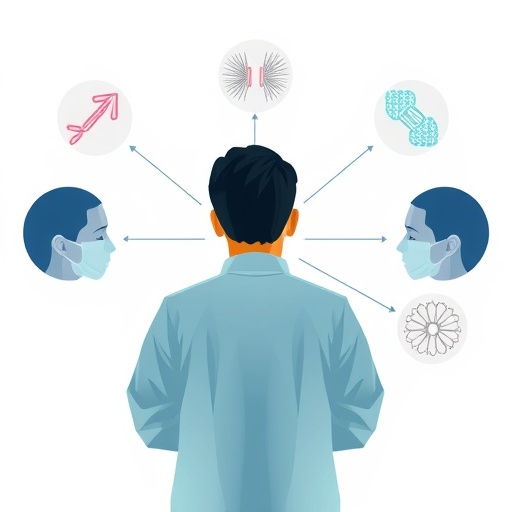A groundbreaking study published recently in Nature Mental Health sheds new light on the real-world efficacy of a revolutionary drug combination aimed at treating psychosis, a debilitating group of disorders that disturb perception and cognition so severely they alter a person’s grasp of reality. Psychosis affects approximately 100,000 Americans annually, posing significant challenges for treatment and recovery. The new drug, known as Cobenfy, represents the first significant pharmacological advancement in schizophrenia treatment in over five decades, blending the mechanisms of xanomeline and trospium chloride for a novel therapeutic approach.
Traditionally, antipsychotic medications function by blocking dopamine D2 receptors, aiming to reduce hallucinations and delusions. However, these treatments often come with cumbersome side effects and variable efficacy across patients, highlighting an urgent need for innovative therapies with different biological targets. Cobenfy diverges from this paradigm by modulating muscarinic acetylcholine receptors in the nervous system, which may underpin different facets of psychotic symptoms. This mechanistic innovation promises to address treatment-resistant cases and offers a fresh biological pathway to improve patient outcomes.
The study, led by Michael Halassa, a neuroscience professor at Tufts University School of Medicine, leveraged electronic health records from 49 individuals diagnosed with schizophrenia, schizoaffective disorder, or bipolar disorder featuring psychotic episodes. All participants were administered Cobenfy alongside their pre-existing antipsychotic regimens after conventional therapies failed to adequately control symptoms. This real-world observational study went beyond controlled clinical trials to explore nuanced, individualized responses in diverse patient populations, aiming for a precision psychiatry approach.
Employing rigorous statistical analyses on two separate patient cohorts, the investigation unearthed distinctive clinical response patterns to the xanomeline-trospium combination, highlighting that psychosis is not a monolithic entity but rather a cluster of biologically distinct subtypes. This finding echoes a shifting paradigm in psychiatry that recognizes the heterogeneity of psychotic disorders, emphasizing the necessity for tailored treatments based on underlying biological and symptomatic profiles rather than a universal pharmacological solution.
One of the study’s pivotal discoveries centered on the subgroup of patients exhibiting pronounced negative symptoms, such as social withdrawal, diminished motivation, and speech reduction. These individuals experienced significant symptomatic relief, including improved mood and enhanced social engagement, after receiving Cobenfy added to their standard antipsychotic drugs. This subgroup’s response indicates that targeting muscarinic receptors might directly influence cognitive and emotional deficits that traditional dopamine-centric drugs often miss.
Conversely, patients presenting predominantly manic or aggressive symptoms associated with bipolar disorder showed minimal benefit from the new treatment, underscoring the drug’s selective efficacy contingent on symptom profiles. Additionally, individuals with intellectual disabilities demonstrated limited improvements, though this observation requires cautious interpretation given the relatively small sample size. The variability in symptom response further asserts the complexity of psychotic disorders and signals limitations of conventional diagnostic categories.
The study also highlighted mixed outcomes for patients suffering from hallucinations, where some experienced moderate improvements while others showed negligible change. This inconsistency suggests that the pathways mediating perceptual disturbances are multifaceted and may require combinatory or adjunctive treatments involving different neurotransmitter systems. These nuanced insights underscore the necessity for comprehensive symptom mapping and longitudinal monitoring in psychiatric care to optimize therapeutic regimens.
Halassa emphasizes that these preliminary findings mark an important move toward precision psychiatry, a developing field that incorporates genetic, cognitive, and biological markers to customize treatments. This approach parallels advances in oncology and immunology, where tailoring therapy based on molecular profiles has transformed prognoses. For psychosis, recognizing distinct subgroups could reduce the prevailing trial-and-error method in medication management, thereby shortening the path to effective recovery and mitigating patient and family burden.
To actualize this vision, Halassa advocates for rigorous clinical trials designed to test various medications across well-characterized patient subsets, tracking symptom trajectories with high granularity over time. This research strategy aims to identify reliable predictive markers of treatment response, improving both therapeutic decisions and clinical outcomes. Such methodology contrasts with conventional clinical trials that often treat schizophrenia as a uniform disorder, potentially diluting therapeutic signals.
Furthermore, Halassa highlights the critical need for clinicians to meticulously document symptom-specific responses rather than solely global improvement scores. Capturing precise data on which symptoms relieve under given medications will create an invaluable dataset to decipher complex treatment dynamics. This data-driven strategy could revolutionize psychosis care by providing actionable insights for clinicians, enabling proactive rather than reactive management.
The implications of this study resonate beyond psychiatry, reinforcing the paradigm that mental illnesses are multifactorial and biologically intricate conditions necessitating equally sophisticated treatment frameworks. As neuroscience tools and computational models become increasingly integrated with clinical research, the hope is to not only improve symptom control but also address the cognitive and functional impairments that impair quality of life in these patients.
In conclusion, this research represents a beacon of hope for individuals living with psychotic disorders and their families. It paves the way for intelligent therapeutics tailored to individual biological and clinical profiles, promises a departure from ineffective one-size-fits-all approaches, and sets a new benchmark in psychiatric innovation. While further validation through expansive, controlled studies remains essential, the initial evidence reveals that the future of psychosis treatment lies in embracing its complexity with precision medicine tools.
Subject of Research: People
Article Title: Preliminary real-world predictors of response to muscarinic targeting in psychosis
News Publication Date: 6-Nov-2025
Web References:
10.1038/s44220-025-00529-w
References:
Halassa, M. et al. (2025). Preliminary real-world predictors of response to muscarinic targeting in psychosis. Nature Mental Health.
Keywords:
Schizophrenia, Psychosis, Precision psychiatry, Muscarinic receptors, Xanomeline, Trospium chloride, Bipolar disorder, Negative symptoms, Antipsychotics, Treatment response
Tags: challenges in treating psychotic disordersCobenfy drug combinationelectronic health records in psychiatryhalting hallucinations and delusionsinnovative psychosis therapiesMichael Halassa neuroscience researchmuscarinic acetylcholine receptorsnovel therapeutic approaches for psychosispharmacological innovations in mental healthreal-world efficacy of antipsychoticsschizophrenia treatment advancementstreatment-resistant schizophrenia





